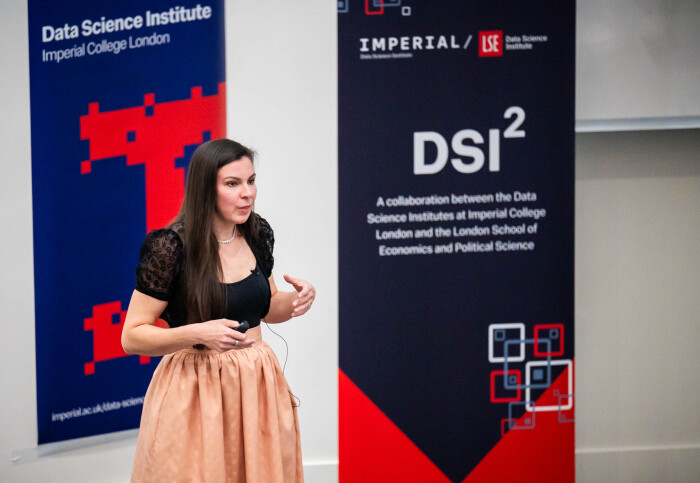Speakers from 10 Downing Street and Google DeepMind talk at DSI Symposium
by Gemma Ralton

Data Science Institutes from Imperial and LSE, co-hosted a symposium exploring how to make Generative AI work well.
The Symposium, which took place on 20/21 May 2024, was the latest event to emerge from an ongoing partnership between the sister institutes known as DSI Squared and represented the second year of the Symposium.
Over two days at Imperial College London and The London School of Economics and Political Science, the two Data Science Institutes (DSI) explored the theme: ‘Making Generative AI Work Well’, which covered applications in research, education, healthcare and policy.
Day one at Imperial closed with a Keynote talk delivered by Dr Laura Gilbert CBE, Director of 10DS, the data science and analytics team at Downing Street. Her talk covered AI, Data and Decision Making – Risks and Opportunities in Public Service.
Dr Gilbert’s team at 10DS provides fast-paced modelling and analysis to support policy making and delivery, deliver expert data and AI solutions into public services, and run a radical transformation agenda promoting the better use of evidence, data and technology in government decision-making.
Day 1: Imperial covers the current technical knowledge around large language models
Day one at Imperial began with a session on ‘The State of AI’ and featured speakers from the Data Science Institute at Imperial and the Department of Informatics at the University of Sussex including Dr Ovidiu Serban, Dr Rossella Arcucci, Dr Wenjia Bai and Professor Ron Chrisley. This session focused on the current technical research on AI with applications in climate science, population imaging and generative AI deployment.
In session two, attendees heard about practical assurance and how we can focus on developing safe and responsible AI from Validate AI’s Shakeel Khan and Imperial’s Professor of Practice in AI & Innovation, David Shrier.
Moving to session three, Imperial DSI’s Dr Yves-Alexandre de Montjoye presented his work on accountability and transparency, focusing on how we can detect the use of copyright protected content by large language models. Selected speakers from throughout the day were joined in a panel discussion focusing on ‘Looking Ahead’ to the future of generative AI and its opportunities and challenges, moderated by Professor Ken Benoit, the DSI Director at the London School of Economics.
Day 2: LSE explored the implications of the use of generative AI in healthcare, sustainability and education
The second day at LSE began with a panel asking whether the use of generative AI in health and healthcare was a help or a hindrance. Experts from LSE, Microsoft, the Kings Fund and Ada Lovelace Institute discussed both the opportunities and challenges of integrating AI into a healthcare setting from the position of policymakers, businesses, and patients.
The second session navigated the role of AI in reaching net-zero emissions. Participants from Connected Kerb, LSE’s Grantham Institute, Energy Systems Catapult and ClimateGPT highlighted the need for a systemic approach to leveraging AI for climate solutions. They examined the capacities and motivations for applying AI to net-zero transitions, and discussed how policy could drive AI adoption in energy and food systems.
The final panel addressed the role of AI in education and its potential to completely transform the learning experience. Representatives from LSE’s DSI, JISC, and the Universities of Cambridge and Manchester explored how AI tools, including chatbots, could enhance critical thinking and deep understanding in education. Discussions included the need to ensure equitable access to AI, to address biases, and to redefine educational objectives so that creativity and effective communication are part of any AI-driven future.
The day ended with a fireside chat between Nicklas Lundblad the Director of Public Policy at Google DeepMind and Ken Benoit Professor of Computational Social Science and LSE Data Science Institute director. Their conversation mapped the trajectory of current AI capabilities over the next three to five years, and explored what this might mean for progress.
Recordings of day 2 can be found on the LSE Data Science Institute YouTube channel here.
‘DSI Squared’ – Bringing together universities across STEM and the social sciences
The ‘Generative AI and The Knowledge Economy’ Symposium formed part of the ongoing collaborative initiative ‘DSI Squared’, which joins the Data Science Institutes from both Imperial College London and The London School of Economics and Political Science.
When it comes to data science research and its impact, the LSE’s strengths in the social sciences naturally complement Imperial’s strengths in science, technology, and medicine.
If you are interested to find out more about the events, opportunities and activities happening as part of Imperial’s Data Science Institute, you can visit the DSI website, or sign up to the DSI Mailing List.
To find out more about LSE’s Data Science Institute,visit their website.
-
Photography by Jim Winslet
Article text (excluding photos or graphics) © Imperial College London.
Photos and graphics subject to third party copyright used with permission or © Imperial College London.
Reporter
Gemma Ralton
Faculty of Engineering







